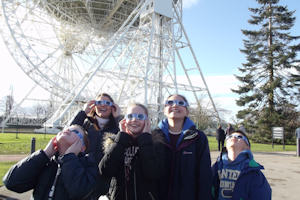Experiencing the eclipse with Jodrell Bank
05 Mar 2015
Solar glasses to safely observe a rare and beautiful astronomical event [NOTE: the solar glasses have now sold out]

On Friday, 20 March the UK will be witness to a rare and beautiful astronomical event – a solar eclipse.
Starting at around 8.30am – the exact times vary by a few minutes around the country – the Moon will slowly begin moving in front of the Sun, reaching maximum coverage by about 9.30am. Seen from the UK, between 85% and 95% of the Sun’s disc will be covered by the Moon.
From the UK this will be a partial solar eclipse, not a total one where the Sun’s entire disc is obscured. Still, this is the best solar eclipse visible from the UK since the total eclipse of 1999 and we won’t get another one as good as this until 2026! This means it is well worth observing this event – but it’s vital you take the necessary precautions.
Firstly, never, ever, under any circumstances, look directly at the Sun without the proper equipment. Looking at the Sun with your naked eye can cause severe long-term damage. Using binoculars or a telescope to look at the Sun can cause instant permanent damage.
If you want to view the eclipse directly you can buy a solar telescope, or some solar glasses – now for sale online at Jodrell Bank Discovery Centre. Visit:
- Jodrell Bank solar eclipse glasses [sold out]
The glasses contain very strong filters; like ultra-mega-strong-sunglasses. They block out more than 99% of the Sun’s light and only let through a tiny, safe amount.
Before you use them though, you must check them every time. Look around you. You shouldn’t be able to see anything, because nothing on Earth is as bright as the Sun. If you can see something, even if it’s just a tiny scratch that’s letting in some light, you can’t use them; they’re not safe.
You can also observe the eclipse indirectly, by buying/building a sun spotter, or a pinhole camera. There’s lots of information on the web that will tell you how to do this.
More information
- Visit: Jodrell Bank Discovery Centre
- Read: Royal Astronomical Society and The Society of Popular Astronomy article
- Watch: Dr Lucie Green’s video guide
